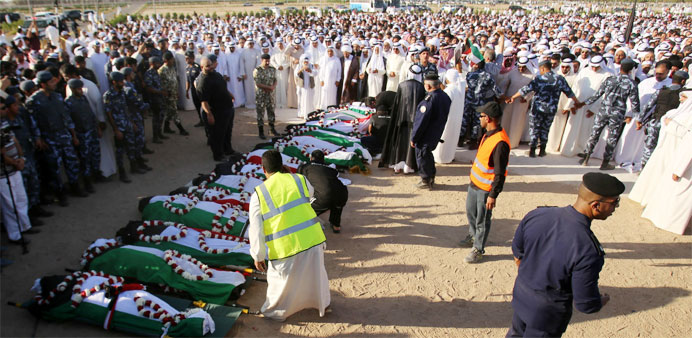AFP/ Kuwait City
Thousands of Kuwaitis braved scorching summer heat on Saturday to attend the funerals of 18 out of 26 victims of a Shia mosque bombing claimed by the Islamic State group.
The bodies of the remaining eight victims will be flown late Saturday to Iraq's Shia holy city of Najaf for burial there, State Minister for Cabinet Affairs Sheikh Mohammad Abdullah Al-Sabah said.
Drapped in Kuwaiti flags, the bodies were borne by mourners who chanted religious slogans.
Mourners turned out in large numbers despite the Ramadan daylight fast and as temperatures hit 45 degrees Celsius (113 Fahrenheit).
"This crowd is the proof that the objectives of the criminal act have failed," parliament speaker Marzouk al-Ghanem told reporters as he led a large number of MPs and ministers to the cemetery west of Kuwait City.
The mourners, who included women clad in black Islamic dress, carried Kuwaiti flags in addition to black and green banners bearing religious slogans.
The interior ministry said in a statement early Saturday that 26 people and the suicide bomber were killed and 227 wounded in one of the country's worst bombings and its first ever on a mosque.
The health ministry said that 40 wounded are still in hospital and the rest have been discharged.
- Sunni solidarity -
Two of the dead were Iranian, the Shia-dominated Islamic republic's foreign ministry said.
Friday's attack targeted Al-Imam Al-Sadeq mosque in Kuwait City during Friday noon prayers.
Condolences were being accepted for three days from Saturday at the Grand Mosque, the largest place of worship for Sunnis , in a show of solidarity.
The interior ministry said it has arrested the owner of the car the bomber used to go to the mosque, and that the driver was now being sought.
The vehicle's owner gave it to someone who drove the suicide bomber to the mosque, a ministry statement said.
The ministry said an unspecified number of suspects were held for questioning in connection with the attack that shook the small Gulf state.
No details were provided.
The government briefed MPs in a joint meeting about measures it has taken after the bombing, Sheikh Mohammad told reporters.
Kuwait's emir, the government, parliament and political groups and clerics have all said the attack aimed to stir up sectarian strife in the emirate.
Sunni religious and political groups were quick to condemn the attack which was claimed by IS, a radical Sunni group which considers Shias to be heretics.
- Security measures -
Shias form a third of Kuwait's 1.3 million native population.
The cabinet announced after an emergency meeting on Friday that all security agencies and police had been placed on alert to confront what it called "black terror".
Justice and Islamic Affairs Minister Yacoub al-Sane said additional security measures will be taken around mosques and places of worship.
Kuwait declared Saturday to be a day of mourning.
The emir, Sheikh Sabah al-Ahmad al-Sabah, who visited the site immediately after the bombing, said the "criminal attack is a desperate and evil attempt targeting Kuwait's national unity".
Countries and organisations including the United Nations and the United States deplored the bombing.
Eight Islamist, liberal and Shia political groups condemned the attack in a joint statement and called on the government to confront extremists.
National oil conglomerate Kuwait Petroleum Corp. (KPC) said on Saturday it had raised security at oil facilities to maximum level.
Oil is Kuwait's main source of income, accounting for around 90 percent of public revenues.
The OPEC member says it sits on around 10 percent of global reserves and pumps around 2.8 million barrels of oil per day.

